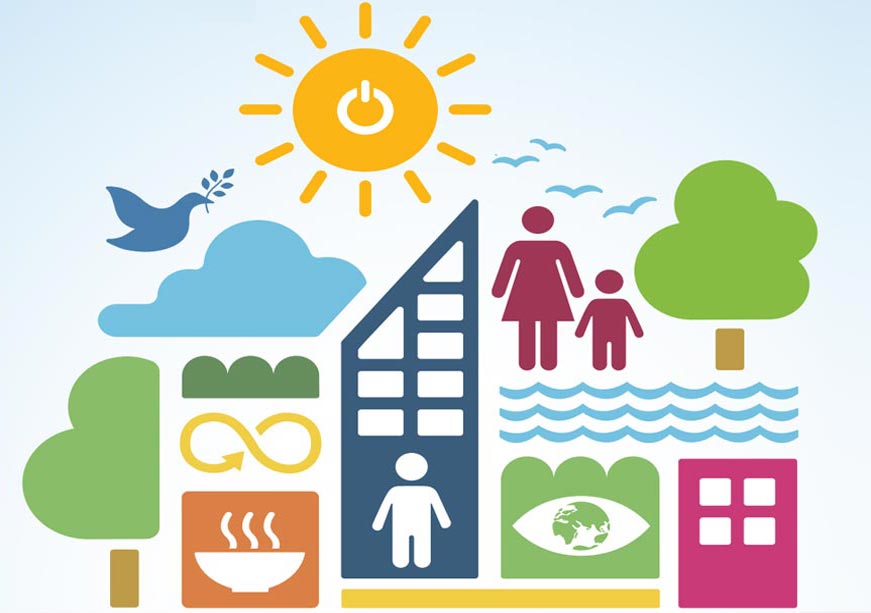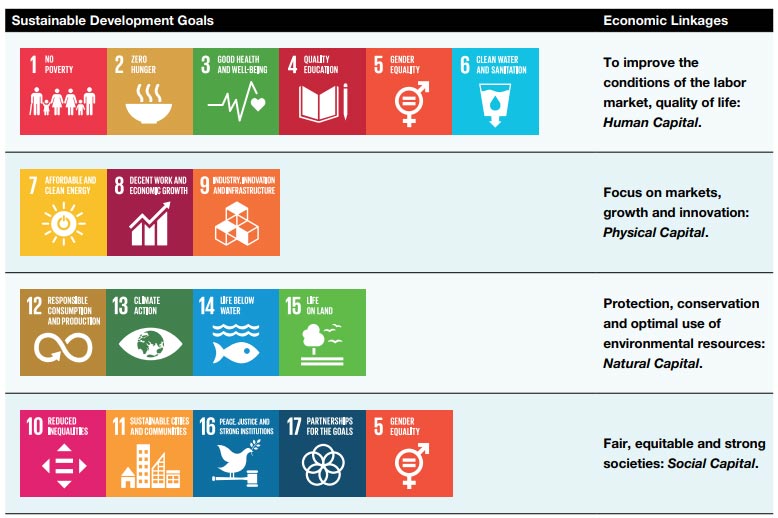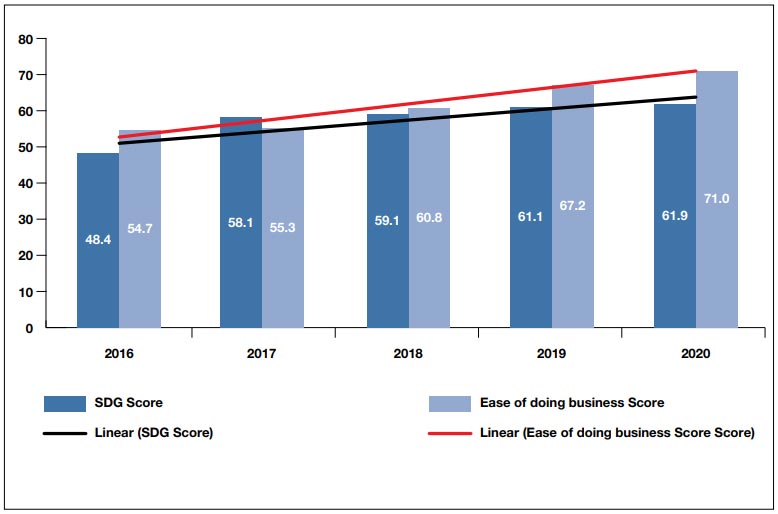-
CENTRES
Progammes & Centres
Location

The UN Sustainable Development Goals (SDGs), endorsed by the UN General Assembly in 2015, stand as a comprehensive blueprint to tackle global challenges ranging from poverty to climate change. Within this context, the BRICS nations have been championing a holistic implementation of the SDGs, recognising the imperative of fostering collective well-being amid these contemporary challenges.
Countries with notable progress in terms of the SDGs have exhibited a more resilient response to the pandemic. However, the inherent nature of SDGs implies a longer-term impact on input and output market conditions. Shortterm measures such as legal and regulatory reforms, incentivisation, and enhanced infrastructure are imperative to bridge this temporal gap. These immediate actions are essential not only for attracting investments but also for fortifying the overall business climate.
Firstly, it is crucial to leverage the SDGs for economic competitiveness. Amid the profound disruptions caused by the COVID-19 pandemic and ongoing geopolitical conflicts, the global economy has witnessed increased insularity, border closures, and disrupted trade. At the midpoint of the Agenda 2030 timeline, it is evident that significant strides are required to meet the SDGs by the 2030 deadline. Aligning the SDGs with demographic, labour market, output market, and innovation parameters can enhance market conditions and stimulate business competitiveness across the BRICS economies.
Table 1: SDGs and Capitals

The interplay of specific SDGs underscores their collective impact on various facets of development. As highlighted by Table 1, SDGs 1-6 focus on demographic parameters that enhance 7,8 and 9 centres on output markets and innovation. SDGs 12-15 delve into natural capital, while SDGs 10, 11, 16 and 17 concentrate on reducing inequality and minimising social conflicts. Realignment with the SDGs emerges as a strategic approach for governments to catalyse business and investment within the BRICS framework.
The interplay of specific SDGs underscores their collective impact on various facets of development
A reciprocal relationship exists between business performance and SDGs. The private sector and multilateral entities are increasingly recognised as pivotal forces in the global pursuit of SDGs. Notably, the private sector is moving beyond the labour market conditions, while SDGs singular objective of short-term profit maximisation, instead prioritising sustainability metrics as a cornerstone of its long-term business strategy.
The systemic design of the SDGs not only provides a comprehensive response to the pandemic but also offers tangible benefits to businesses. These advantages encompass the reduction of long-term risks stemming from environmental, political, and social factors, the mitigation of information asymmetry through positive externalities, the enhancement of market resilience through SDG integration into budgets, and the potential for market expansion and job creation via new business solutions aligned with the SDGs.
Figure 1: India’s SDG and EDB Index Scores (out of 100)

Secondly, the SDGs provide a holistic approach to business environments, which would be crucial for the BRICS and ‘BRICS plus 6’ economies in the longer horizon. Statistical evidence substantiates a robust causal relationship between SDGs and the business environment across nations. In fact, this theory holds at the subnational levels, too. For example, Figure 1 illustrates a consistent upward trend in India’s SDG and Ease-of-Doing Business (EoDB) indices from 2016- 2020, offering indicative evidence of the interconnectedness between the two.
Therefore, post-pandemic policy planning must extend beyond traditional forms of capital to encompass natural and social capital. Economic models should realistically portray the limits of substituting humans for natural capital and account for the critical role of ecosystem services and marketing natural resources. This inclusive approach ensures that policy actions consider social, environmental, and economic factors in upholding sustainable development without compromising on the intra-generational and inter-generational equity aspects.
The correlation between sustainable development and the business climate lays the foundation for an objective decisionmaking instrument.
The correlation between sustainable development and the business climate lays the foundation for an objective decision-making instrument. This approach seeks to reconcile the trinity of equity, efficiency, and sustainability, offering significant policy implications. By advocating for a holistic policymaking approach, especially in developing countries like BRICS, it is critical that a departure from growth-focused policies can mitigate negative social and environmental externalities, fostering resilience against macroeconomic shocks such as those stemming from the COVID-19 pandemic or the impact of the ongoing geopolitical conflicts on the world energy and food markets.
Finally, a country’s development policy should be intricately linked to its investment and business promotion strategy. The absence of a robust business case for SDGs within the BRICS framework necessitates renewed political will and global engagement. As we navigate the challenges of the ‘decade of action,’ scepticism, difficulty in achieving goals, and a widening resource gap, collaborative efforts among BRICS governments and other global players are essential for realising the transformative potential of the 2030 Agenda.
This commentary originally appeared in BRICS Academic Review.
The views expressed above belong to the author(s). ORF research and analyses now available on Telegram! Click here to access our curated content — blogs, longforms and interviews.

Soumya Bhowmick is a Fellow and Lead, World Economies and Sustainability at the Centre for New Economic Diplomacy (CNED) at Observer Research Foundation (ORF). He ...
Read More +